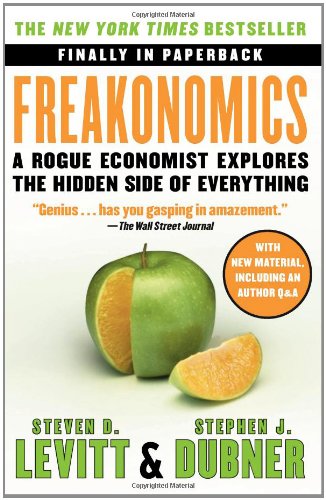All Nonfiction
- Bullying
- Books
- Academic
- Author Interviews
- Celebrity interviews
- College Articles
- College Essays
- Educator of the Year
- Heroes
- Interviews
- Memoir
- Personal Experience
- Sports
- Travel & Culture
All Opinions
- Bullying
- Current Events / Politics
- Discrimination
- Drugs / Alcohol / Smoking
- Entertainment / Celebrities
- Environment
- Love / Relationships
- Movies / Music / TV
- Pop Culture / Trends
- School / College
- Social Issues / Civics
- Spirituality / Religion
- Sports / Hobbies
All Hot Topics
- Bullying
- Community Service
- Environment
- Health
- Letters to the Editor
- Pride & Prejudice
- What Matters
- Back
Summer Guide
- Program Links
- Program Reviews
- Back
College Guide
- College Links
- College Reviews
- College Essays
- College Articles
- Back
Freakonomics by Steven Levitt and Stephen Dubner
When you look at a statistic, what do you see? Usually just numbers, preceded or succeeded by some context so as to define what those numbers mean. But while most are content with only this and even cite it hundreds of times over, there’s a lot more to think about past those numbers. Consider exploring the “why” as a bold and potentially insightful way to approach facts and figures that expose the world around you. After all, numbers can only say so much. Asking yourself why people behave the way they do opens many doors to understanding the “hidden side of everything” - what makes people tick and why. Steven Levitt, an economist at the University of Chicago, dedicates himself to ask “Why?” then answer his own questions for the benefit of his audience.
Freakonomics, being a collaboration between Steven Levitt and award winning author Stephen Dubner, focuses on the examination of several different and supposedly unrelated topics, such as the connection between a teacher’s incentives to fudge numbers on standardized test scores and a sumo wrestler’s incentives to cheat in order to remain on the top of the hierarchical ladder among professional sumo wrestlers, with many statistics provided a basis for such theories. Levitt’s conclusions can range from fairly obvious to highly controversial, spending several pages and exhausting many figures only to conclude that a child’s name won’t affect his score on a standardized test, then suddenly jumping at you with the claim that the crime drop of the 1990s can be traced back to abortion slowly becoming legalized throughout the United States. The controversial issues keep you interested and even the less interesting studies leave you wondering when Levitt will catch your interest again through a potent and smooth segue into another thought provoking discussion.
By writing in an anecdotal and informal style, Dubner keeps the book from becoming dry, considering its content may appear stale to a skeptical reader. Once it’s hooked you in, the book remains breezy and rather casual, as if it were a somewhat informal lecture. The book is also fairly easy to understand as Levitt tends to hand you conclusions and final statements on a silver platter. At the same time, readers are still given the opportunity to examine the evidence and trends that are provided and come to their own conclusion as opposed to having the job done for them, opening up the potential for a wide range of audiences - some want to be spoken to and others want to draw conclusions by and for themselves - keeping a conversational tone, organizationally flowing, while still maintaining a serious and contemplative environment. “But,” you may ask, “does any of this really matter if the actual content doesn’t hold up or lead to some sort of general conclusion? What is the point?”
If there’s anything I’ve learned from this book, it’s that I’m certainly in no position to tell you what the point is. Read, discover, and interpret for yourself what the theme or lesson of Freakonomics is. It’s a fairly short read (just barely 200 pages unless you’re reading the expanded and revised edition) and extremely easy to jump into. It’s a lively read and enormously enjoyable while remaining engaging and provocative in its more controversial passages. If you’ve ever found yourself interested in works that promote or display counter intuitive thinking such as Malcolm Gladwell’s The Tipping Point then you’ll likely find Freakonomics difficult to put down.
Similar Articles
JOIN THE DISCUSSION
This article has 0 comments.

